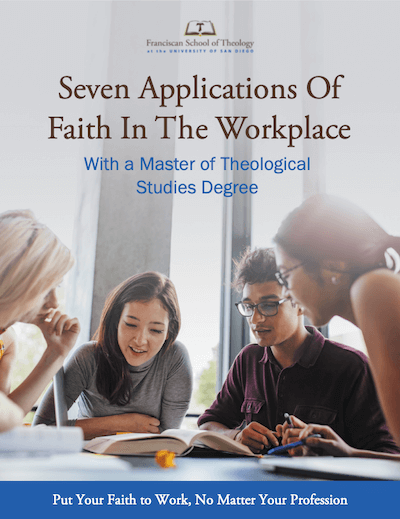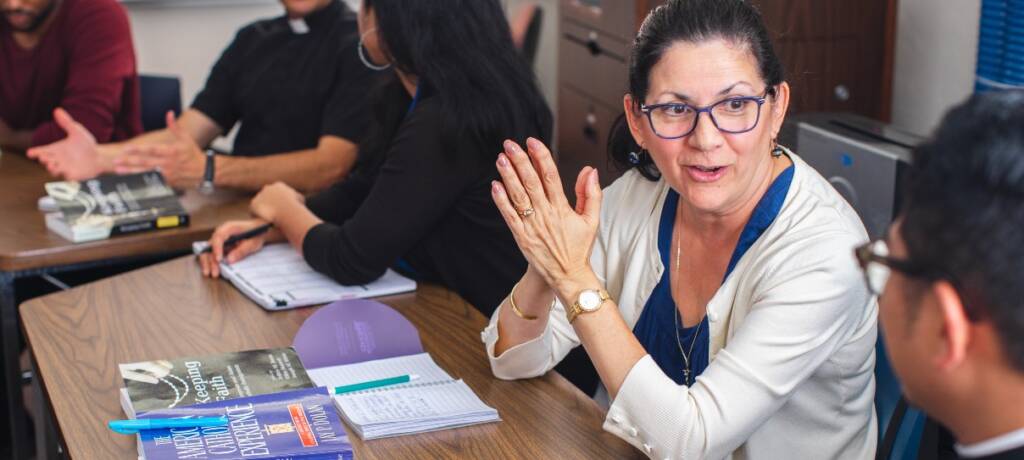When exploring your options for faith-based education at the college or graduate school level, it can sometimes be confusing to determine which type of program will best align with your goals. For example, a Master of Theological Studies might sound similar to a Master of Religious Studies or a Master of Ministry. Still, some fundamental differences set these degree programs apart.
Whatever your ultimate goals may be, there is a master’s program out there for anyone seeking a deeper faith connection to professional or personal pursuits. Here, we’ll break down what makes a Theological Studies program unique and how it is designed to align with specific career paths.
What is Theological Studies?
First, let’s define what theology is.
Theology is the study of religion, specifically religious thought and traditions expressed through the language, worship, literature, and art associated with a particular faith. Theology also examines the philosophical, ethical, and metaphysical questions ever-present in faith; those who study theology seek to understand how the divine relates to our world today and throughout history. In a formal Theological Studies program, there is a strong emphasis on intellectual discussions and academic presentations of students’ findings and conclusions.
Theology degree programs are often aligned with a specific faith but are not necessarily the track for those who want to enter the ministry. Of course, graduates of this kind of program may wish to move on to seminary, ordination, or another kind of religious career. Still, many choose to apply their degree to careers unrelated to religion.
What is Religious Studies?
Religious Studies programs often take a more historical or sociological — that is, external — approach to the study of faith than theology. Whereas a student of Theological Studies might choose a program that aligns with their own faith, Religious Studies programs are designed so that anyone can study any faith that interests them. Students drawn to studying multiple world religions may find a Religious Studies degree program to be an appropriate fit.
Theological Studies vs. Religious Studies [Comparison Table]
| Theological Studies | Religious Studies | |
| Focus |
|
|
| Prerequisites |
|
|
| Career Opportunities |
|
|
| Thesis examples |
|
|
| Related Studies |
|
|
Anyone interested in these career paths should note that many of these professions require additional degrees or certifications.
What Do You Learn with a Theological Studies Degree?
Theological Studies is much more than the study of a holy text like the Bible or the Quran. It is the systematic study of traditions, observation, and concepts of a particular faith’s divine and religious truths. Areas of focus may include (but are not limited to):
- Study and interpretation of scripture
- History of worship
- Philosophy of faith
- Practical applications of faith
- Cultural impacts of religion
These programs are offered by many universities that adhere to a specific denomination — such as Catholic or Methodist — and so theology courses will be taught within the framework of that faith. However, theological studies classes can explore other world religions, albeit through the lens of one religion. This helps students understand the moral and ethical dilemmas experienced within other faith systems, and therefore can provide them with context for interfaith relations.
Since it is so rooted in philosophy and historical context, the study of theology does not shy away from difficult truths. Students and instructors pose challenging questions, study uncomfortable facets of history, and ponder unsettling truths about the past, present, and future of religion. Faith is explored from all angles, including the symbiotic relationships it has with other disciplines, such as:
- Literature
- Cultural criticism
- Architecture
- Art
- Music
- Symbology
- Psychology
- Economics
- Law enforcement
- Linguistics
- Politics
- Education
- Healthcare
To succeed in a Theological Studies program, students are asked to demonstrate and exercise critical thinking, clear writing skills, problem-solving, and the ability to analyze historical and social trends through sources and scholarly interpretations. Some programs offer a language component so that students can learn the languages in which the original sacred texts were written, such as Hebrew or Ancient Greek.
Some theological studies programs give students the option to specialize in one area, such as the expression of faith through music or the church’s relationship with marginalized peoples throughout history.
Why Study Theology?
Even if entering the ministry isn’t a student’s ultimate career goal, studying theology can strengthen the bond someone has with their faith or open up entirely new doors. Theology, like economics or political science, can even expand a graduate’s career options to a global scale since many world religions know no borders.
Theological Studies is a natural fit for those who like to:
- Debate or reflect on issues of religious ethics
- Reflect deeply and analytically on their religious and spiritual beliefs and practices
- Critically analyze arguments for the existence of the divine
- Contemplate long-standing metaphysical debates, such as finding meaning in suffering
- Engage with the intellectual and spiritual tradition of their faith
- Participate in large-scale discussions of social justice
- Seek answers to global issues related to the environment, leadership, and public health, among others
A theology degree can give graduates deeper context for the world around them, whether they go on to enter a faith-based profession like youth minister or religious studies teacher, or whether their career goals lie outside faith-based service.
For example, a substantial number of theology students become lawyers, since the principles of faith can help them address the ethical and moral quandaries that may arise when building a strong defense or prosecution. Alternatively, many practicing lawyers will enter a theological studies master’s program to deepen their personal practice.
A large number of theology graduate students are making a mid- or late-career change or broadening their scope in their respective fields. These individuals can include healthcare professionals, entrepreneurs or other business professionals, mental health counselors, and more.
Many graduates of a theological studies program also enter the charitable or nonprofit sector, since the desire to help others far outweighs the desire for financial gain.
How to Find the Right Theology Degree For You
As you begin the search for the right theology degree program, consider your reasons for pursuing one. Your ultimate goal may be to work in a religious profession; to build a foundation of meaning and purpose for an unrelated profession; to build a deeper connection to your faith, or to open up new professional or personal doors through the study of faith. Defining your goals will help you decide on the appropriate school or program.
Here are some important questions to help you narrow down your search:
- What are your personal criteria for the program? E.g., is there a focus on social justice, a sacred music module, or other specializations that interest you?
- What have graduates of the program gone on to do?
- Does the program have a capstone or thesis component?
- Are there practical components to the program?
- Does the program align with your specific values or beliefs? Is this important to you?
This last question, especially in the context of theological studies, can have a major effect on your decision. While many theology degree programs explore concepts through the lens of one faith, that does not necessarily translate to a narrow scope of study. For example, a school that teaches from a Franciscan Catholic perspective welcomes all faiths and even those who are unsure where they stand when it comes to religion. Franciscan Theology teaches that there is good in all God’s creatures, and within the faith, there is a strong focus on inclusivity and active service, both in and outside the church.
Frequently Asked Questions
Q. What do people who study theology do after graduation?
A. With a theology degree, the career paths are almost limitless. Many people who study theology will enter a religious profession like campus ministry or spiritual counseling. But many more will go on to a wide range of careers, such as mental health counselor, educator, civil servant, lawyer, or journalist, to name a few. Studying theology gives people important context for the world around them, and can help students strengthen their ethical, moral, and personal commitments, while cultivating deeper respect and understanding for other people’s viewpoints and commitments.
Q. What’s the difference between a Theological Studies degree and a Religious Studies degree?
A. A Theological Studies degree program examines religion through the lens of one faith, and challenges students to consider and debate ever-present philosophical questions about meaning and the presence of the divine. A Master of Theological Studies is required to teach religion at the secondary or community college level. Religious Studies approach faith from a much more external position and are appropriate for people who are academically interested in world religions.
Q. Do I need a theology degree to teach?
A. Many religious secondary schools require at least a Master of Theological Studies, Ministry, or Divinity, as do some community colleges. These degrees are not always required to teach at the elementary level. Those who wish to teach at the university level often must have a doctorate degree in Theology or Philosophy.
Q. How long does a theology degree program take?
A. A theology degree program can take anywhere from two to four years, depending on the student’s course schedule or level of study. For example, a bachelor’s degree in Theological Studies can take four years to complete with a full-time course load, whereas a Master of Theological Studies can take only two years to earn on a part-time schedule.
Q. I am an “X” major. Can I take a theology postgraduate?
A. Generally, theology master’s degree programs are open to anyone who is familiar with the religion that guides the program. Undergraduate programs may take a more abstract and theoretical approach to a specific religion through introductory classes, whereas a master’s degree program may require that students already have the appropriate context for the coursework.
Q. What is the difference between a theology course and a Master of Theological Studies?
A. A standalone theology course may take a broad approach to the study of religion, particularly if the course is available to students outside a Theological Studies degree program. While the course may be taught through the lens of one religion — particularly if the institution itself is religious — it will likely focus on multiple religions across the globe, their history, and their traditions. A Master of Theological Studies is a rigorous academic program designed to prepare graduates to enter professional fields informed by their study of faith.
Q. I work a full-time job, is there a theology program I can take online?
A. Yes! Many schools (like the Franciscan School of Theology at the University of San Diego) offer online Master of Theological Studies programs that can be completed in two years. Students anywhere in the country can take advantage of these location-agnostic programs, many of which can be accessed on the timeline that is most convenient for the student. Online Master of Theological Studies programs can often be taken part-time, which is ideal for someone who needs a more flexible schedule.
![What is Theological Studies? [+ Degree Comparison]](https://onlinedegrees.sandiego.edu/wp-content/uploads/2022/01/what-is-theological-studies.jpg)



